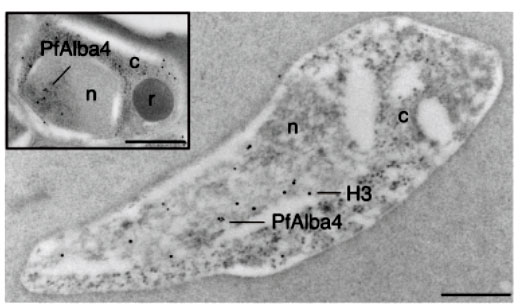Immuno-EM was performed on ring stage parasites using anti-PfAlba4 antibodies (Ab 237–2) bound to 10nm gold particles and anti-H3 antibodies bound to 15nM gold particles. The inset shows a single developing merozoite within schizont-stage parasites labeled with anti-PfAlba4 antibodies (Ab 237–2) bound to 10nm gold particles; n=nucleus, c=cytoplasm, r=rhoptry; Scale bars represent 500 nm. In the ring stage, we detected PfAlba4 uniquely in the nucleus. Since the nuclear membrane is difficult to visualize in immuno-EM in the ring stage, co-labeling with antibodies directed against histone H3 was used to determine the area of the nucleus in this parasite form. The images localize PfAlba4 at the nuclear periphery. This pattern was confirmed in developing merozoites (inset) where distinct clusters of PfAlba4 could be detected at the periphery of the nuclei.
Chêne A, Vembar SS, Rivière L, Lopez-Rubio JJ, Claes A, Siegel TN, Sakamoto H, Scheidig-Benatar C, Hernandez-Rivas R, Scherf A. PfAlbas constitute a new eukaryotic DNA/RNA-binding protein family in malaria parasites. Nucleic Acids Res. 2011 Dec 13. [Epub ahead of print]
Other associated proteins
| PFID | Formal Annotation |
|---|---|
| PF3D7_0617900 | histone H3 variant |
| PF3D7_1333700 | histone H3-like centromeric protein CSE4 |
| PF3D7_1347500 | DNA/RNA-binding protein Alba 4 |
